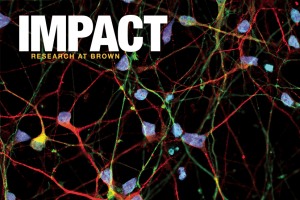PROVIDENCE, R.I. [Brown University] — Anyone who has ever spent time in Rhode Island knows that Lil Rhody — as it’s affectionately called — often feels like one big small town. It’s a statewide community of just over one million people, 70 percent of whom never relocate out of state.
Rhode Island’s small size and stability was an advantage in Advance Clinical and Translational Research (Advance-CTR) being established at Brown in 2016. A $19.5 million statewide award was secured in a competitive process from the National Institute of General Medical Sciences. “Rhode Island is an excellent test-bed for research,” said Neil Sarkar, director of Advance-CTR’s biomedical informatics core.
With involvement from Brown University, Advance-CTR’s partners at the University of Rhode Island and affiliated hospitals across the state, the program is already proving to be a changemaker. Its impact spans dozens of projects for big data research, community engagement, medical technology discoveries and more.
“We’ve created a centralized hub of resources for all health-focused researchers in Rhode Island,” said James Padbury, program director of Advance-CTR and professor of pediatrics at Brown’s Warren Alpert Medical School. “In our first three years, we funded 66 investigators and provided research support and training that were previously unavailable on a statewide level. This fills a crucial need, while putting major resources toward studies that tackle the health priorities of our local communities.”
Here are three of Advance-CTR’s projects so far:
Pilot state
Rhode Island is not just the Ocean State — it’s also a pilot state. That’s what Sarkar and others had in mind when they brokered a deal with the state to leverage Rhode Island’s All-Payer Claims Database for unprecedented big data health research.
The all-payer information is a powerful dataset that houses nearly all medical and pharmacy bills for the state’s residents in one place. With this access, Sarkar said researchers can now track — with patient confidentiality and data security safeguards in place — every person who has had a heart attack or shoulder surgery instead of having to select from a sample of patients. Thanks to Rhode Island’s high resident retention, researchers can track patients over the long term.
“This data is a gamechanger,” said Brett Owens, a professor of orthopaedics at the Warren Alpert Medical School and one of five investigators at Brown and URI who are leveraging the data so far.
Owens is studying the differences in outcomes among patients who seek treatment for shoulder injuries. “There’s a huge care disparity in our state, but being able to track patients’ outcomes, and map it to demographic factors, gives us the opportunity to fix the cracks in healthcare delivery in our communities,” he said.
Food is life
When Marcella Thompson, assistant professor of nursing at URI, and Elizabeth Hoover, associate professor of American studies at Brown, learned contaminants were found in fish at the Narragansett Indian Tribe’s reservation in Charlestown, R.I., they wanted to help.
They teamed up with Dinalyn Spears, the Narragansett’s director of community planning and natural resources, and secured funding from Advance-CTR to develop a survey. They wanted to understand how much fish tribal members eat from local ponds and work with the community to make informed decisions about what to do next.
It’s a complex issue to navigate, Thompson explained, as fishing is not just sustenance to the Narragansetts — it’s a cherished practice that connects them to their ancestry, traditions and culture.
“They are a sovereign nation,” Thompson said. “Some of them have said, regardless, because it’s so important to them, they’re going to continue to eat the fish from these ponds.”
That understanding is at the heart of the project. Spears said initial resistance is common until members have a full understanding of the risks and tribal government sets healthy fish and shellfish consumption levels. When the researchers bring the results to Narragansett tribal leadership, they and tribe members will discuss what to do next.
From science to startup

Eliza Van Reen and Gustavo Fernandes were working at Brown on a “smart” lighting system to help sleep-deprived teenagers perform better in school. The multi-disciplinary pair — she an assistant professor of psychiatry and human behavior, and he an engineering researcher — saw an opportunity to aid people whose lives don’t match up with internal clocks, like shift workers and security guards.
They received funding from Advance-CTR to establish proof-of-concept and wrote a patent application. The idea of taking their software out of the lab and into the market began to feel achievable.
Two years after Van Reen and Fernandes founded Circadian Positioning Systems in Newport, she said the business is doing well.
“We’re developing a wearable that tracks sleep and wake, that’s been validated against the laboratory-based gold standard measures,” Van Reen said. “We’re excited to expand our offerings in health care and operational settings and, eventually, maybe even to consumers.”
Van Reen and Fernandes are Advance-CTR’s first awardees to make the jump from academia to industry, and program leadership expects more.
“By staying in Rhode Island, they’re translating their findings back into the communities they serve, which is our goal for all our awardees,” said Edward Hawrot, program coordinator and senior associate dean for Brown’s program in biology. “Our goal is to improve health in Rhode Island.”
Advance-CTR is in the fourth year of its five-year award. Padbury said they’ll apply for another five years of funding in fall 2020, and continue with their goal to “lay the infrastructure for a sustainable, collaborative, and statewide research environment.”
Portions of this article were previously published in Medicine@Brown.
